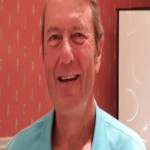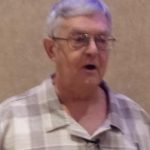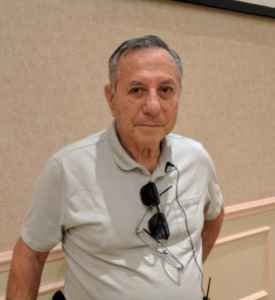In the wake of an election where one presidential candidate won the popular vote while the other captured a electoral vote majority and the election, some people are questioning the value of the Electoral College.
![doug-hughes]() That was the focus of a presentation Monday by Villager Doug Hughes to members of the Civil Discourse Club meeting at the Savannah Center.
That was the focus of a presentation Monday by Villager Doug Hughes to members of the Civil Discourse Club meeting at the Savannah Center.
Electoral votes normally are based on the popular vote in each state. But Hillary Clinton received over 2 million more votes that Donald Trump, who won the electoral vote majority by unexpectedly capturing Wisconsin, Michigan and Pennsylvania.
The 535 electors of the Electoral College will meet Dec. 19 in each state to cast ballots for President. The results are forwarded to Congress, which will open them Jan. 6 in a joint session. To be elected, a candidate must receive at least half or 270 votes.
If no candidate receives at least half of the votes, the House of Representatives decides the election with one vote per state.
Hughes, who teaches courses on the U.S. Constitution at The Villages Lifelong Learning College, said the Founding Fathers decided toward the end of the three-month constitutional convention that the President should be selected by a separate body from Congress so he would not be obligated to Congress for the job.
“The procedures were fairly straight-forward,” he said. “The (state) legislatures would determine who the electors would be.”
In the 1800 election, Hughes said, the House cast 36 ballots before electing Thomas Jefferson as the nation’s third president. John Quincy Adams was selected by the House in the 1824 election.
When the nation began, states did not tally popular votes.
“By (1824), popular voting was gaining popularity,” he said. “Of 24 states, 18 had popular votes.”
In a half dozen elections over the past six decades, the winner got less than half of the popular vote. Winners in those elections were John F. Kennedy in 1960, Richard Nixon in 1968, Bill Clinton in 1992 and 1996, George W. Bush in 2000 and Donald Trump in 2016.
After the 1968 election, Hughes said, a movement began to abolish the Electoral College. The measure was passed by the House, but lost in the Senate.
“It was filibustered to death by southern states that felt their power would somehow be diminished,” Hughes said.
He said the Electoral College is the reason candidates focus their efforts on toss-up states.
“The existence of the Electoral College impacts the process approaching the election and during the election,” he said.
Hughes said there are three options to change the Electoral College.
The first is a constitutional amendment to abolish it, like the one proposed in 1969, but he said that might be difficult.
“Those 1969 attitudes are still there,” he said, and smaller states would likely oppose it.
A second change would be to follow the lead of Maine and Nebraska, which select presidential electors according to the popular vote in each congressional district instead of statewide.
“You would get a better distribution of the vote,” Hughes said, although it could closely follow the political makeup of Congress.
The third option for circumventing the Electoral College would be for states to pledge to cast their electoral votes for the winner of the national popular vote regardless of the outcome in their states.
Ten states, including California, Illinois, Maryland and New York, with 165 electoral votes have taken the pledge, joining the National Popular Vote Initiative. The pledges would take effect when enough states join to amass 270 electoral votes.
Except for a few constitutional amendments, such as giving voting rights to women, most election law is left to the states, Hughes said. Some states, for example, allow felons to vote after they have completed their prison sentences while others do not.
“Perhaps you want to change it so it’s uniform throughout the country,” he said. “But shouldn’t the states have some control over how the process (works)?”
During the audience discussion, some speakers favored abolishing the Electoral College, while others said it serves a critical function.
“We should be counting all the votes,” said Mary Ann Swisher of the Village of Rio Grande. “We should definitely get rid of the Electoral College.”
But Jim Addington of the Village of Tamarind Grove said our electoral system as created by the Founding Fathers is the envy of the world and should not be changed.
“They could not know everything that’s going to happen, but it went very well,” he said. “They wanted proportional representation.”
![Facebook]()
![Google+]()
![AOL Mail]() Share
Share
This post Villager offers brush up on Electoral College in wake of polarizing presidential contest was published originally on Villages-News: News, events, classifieds in The Villages, FL. Any use of this post without prior consent from Villages-news.com will constitute a breach of the Digital Millennium Copyright Act.









